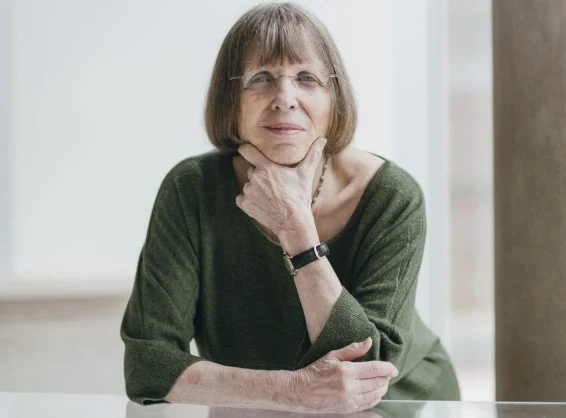Ética
Hace muchos años en clase de ética
nuestro profesor nos preguntaba cada otoño:¿si se prendiera el fuego en un museo
qué es lo que salvarías, una pintura de Rembrandt
o una anciana a la que de todos modos
no iban a quedarle muchos años de vida? Impacientes en las duras sillas
nos preocupaban poco los cuadros o la vejez,
optábamos un año por la vida, al siguiente por el arte
y siempre con poco entusiasmo. A veces
la mujer adoptaba el rostro de mi abuela
dejando por una vez la cocina para recorrer
algún museo inhóspito y sólo a medias imaginado.
Un año, creyendo ser ingeniosa, respondí
¿por qué no dejar que decida la anciana?
Linda, explicó el profesor, evita
la carga de la responsabilidad.
Este otoño, casi anciana yo misma,
estoy en un museo real
frente a un verdadero Rembrandt. Dentro del marco
los colores son más oscuros que el otoño,
más oscuros aún que el invierno— los ocres de la tierra,
aunque los elementos más brillantes arden
a través del lienzo. Ahora sé que la mujer,
la pintura y la estación son casi una sola cosa
y todas más allá de la salvación de los niños.
El día más feliz
Era los primeros días de Mayo, creo
un momento de la lila o cereza silvestre
cuando tantas promesas se hacen,
difícilmente preocupe si algunas no se cumplen.
Mi madre y mi padre todavía suspendidos
en la experiencia, parte del paisaje
como las casas en donde había crecido,
Y si habrían de ser derribadas después
fue algo que yo sabía
pero no creía. Nuestros chicos estaban dormidos
o jugando, el más chico tan nuevo
como el nuevo aroma de la lila,
y cómo pude haber adivinado
sus raíces eran superficiales
y serían fácilmente trasplantadas.
No supe incluso que era feliz.
Los pequeños enojos que eran como sal
sobre el melón fue sobre lo que me obstiné,
aunque en verdad ellos simplemente
hicieron el sabor de la fruta más dulce.
Entonces nos sentamos en el porche
en la mañana fría, sorbiendo
café caliente. Detrás de las noticias del día—
huelgas y pequeñas guerras, un incendio en algún lugar—
Pude ver lo alto de tu cabeza negra
Y pensé no en conflagraciones públicas
sino en cómo se sentirían en mi hombro desnudo.
Si alguien pudiera parar la cámara entonces...
Si alguien pudiera no sólo parar la cámara
Y preguntarme: sos feliz?
Quizás me habría dado cuenta
cómo la mañana brilló en el color
reflejado de la lila. Sí, podría haber dicho
y ofrecido una taza humeante de café.
Ethics
In ethics class so many years ago
our teacher asked this question every fall:
If there were a fire in a museum,
which would you save, a Rembrandt painting
or an old woman who hadn’t many
years left anyhow? Restless on hard chairs
caring little for pictures or old age
we’d opt one year for life, the next for art
and always half-heartedly. Sometimes
the woman borrowed my grandmother’s face
leaving her usual kitchen to wander
some drafty, half-imagined museum.
One year, feeling clever, I replied
why not let the woman decide herself?
Linda, the teacher would report, eschews
the burdens of responsibility.
This fall in a real museum I stand
before a real Rembrandt, old woman,
or nearly so, myself. The colors
within this frame are darker than autumn,
darker even than winter — the browns of earth,
though earth’s most radiant elements burn
through the canvas. I know now that woman
and painting and season are almost one
and all beyond the saving of children.
The Happiest Day
It was early May, I think
a moment of lilac or dogwood
when so many promises are made
it hardly matters if a few are broken.
My mother and father still hovered
in the background, part of the scenery
like the houses I had grown up in,
and if they would be torn down later
that was something I knew
but didn't believe.
Our children were asleep
or playing, the youngest as new
as the new smell of the lilacs,
and how could I have guessed
their roots were shallow
and would be easily transplanted.
I didn't even guess that I was happy.
The small irritations that are like salt
on melon were what I dwelt on,
though in truth they simply
made the fruit taste sweeter.
So we sat on the porch
in the cool morning, sipping
hot coffee.
Behind the news of the day--
strikes and small wars, a fire somewhere--
I could see the top of your dark head
and thought not of public conflagrations
but of how it would feel on my bare shoulder.
If someone could stop the camera then.
if someone could only stop the camera
and ask me: are you happy?
perhaps I would have noticed
how the morning shone in the reflected
color of lilac.
Yes, I might have said
and offered a steaming cup of coffee.
LINDA PASTAN (1932, Nueva York, Estados Unidos de Norteamérica)
"Ética", incluido en Siete poetas norteamericanas actuales (Editorial Pamiela, Pamplona, 1991, selección y traducción de Rosa Lentini y Susan Schreibman).
Fuente:https://franciscocenamor.blogspot.com.ar/2013/12/poema-del-dia-etica-de-linda-pastan.html
"El día más feliz",publicado en http://www.poetrysoup.com/famous/poem/9166/the_happiest_day
Traducción: Myriam Rozenberg
Imagen: Seattle Art & Lectures




Publicar un comentario